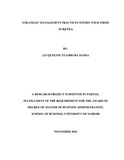| dc.description.abstract | The environment within which businesses operate is very volatile. Political anxiety, competition from existing business rivals and new entrants, social reforms, technological advancement and global changes are some of the challenges that have greatly affected the growth of the tourism industry. Dealing with competition especially, requires a deep understanding of strategic management in order for firms to correctly respond to the market. Strategic management is a concept that concerns itself with making decisions and taking corrective actions to achieve long term targets and goals of an organization and its importance in a firm can be gauged by analyzing the relationship between strategic management and organizational performance. Generally, strategic management practices help to develop policies and plans designed to improve the efficiency of organizations by setting priorities, focusing energy and resources, strengthening operations and ensuring that employees and other stakeholders are working toward common goals. The study was to determine the strategic management practices within tour firms in Kenya and whether the implementation of such practices led to their improved competitiveness and performance within the industry. The research design was a cross-sectional survey with the population of the study being tour firms currently doing business in Kenya. The sample was chosen using the purposive or convenience sampling technique in which 56 tour firms were to make up the sample size for the study. The data collection instrument was a questionnaire for purposes of collecting primary data. The data was analyzed and presented using mean, standard deviation and percentages. The study found that strategy formulation, implementation and evaluation was being practiced by the tour firms in Kenya and further that most of the firms practicing strategic management have a clear objective, a winning strategy to achieve the objective and a sound mission statement to guide the organization towards success. The study also found that tour firms are able to identify the strengths and weaknesses of their firms as instigated by management skills, organization structure, client relationship, image and reputation and profit. The study concluded that tour firms which implemented a strategic management and planning system achieved higher performance when coupled by the review of current strategies, measurement of performance and the taking of corrective actions further leading to the success of organizations. However, owing to the specialization of product and competition among tour firms in the Country, obtaining in depth information from all the firms identified was difficult as it was feared that the information might be shared with other firms and prejudice their operations. This was identified as the major limitation of this study. Future research studies can be designed on a higher level to investigate the relationships between adoption of strategic management practices and performance of tour firms | en_US |

